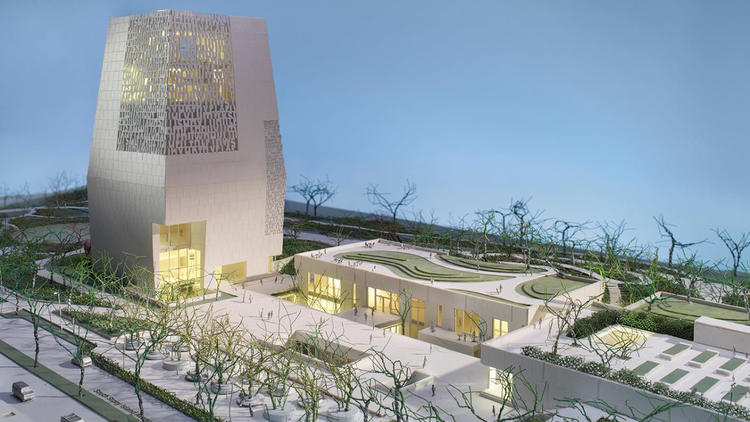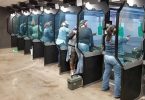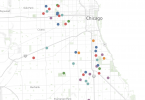The center “surely provides a multitude of benefits to the public. It will offer a range of cultural, artistic, and recreational opportunities … as well as provide increased access to other areas of Jackson Park and the Museum of Science and Industry,” U.S. District Judge John Robert Blakey said in a written ruling hours after hearing arguments on both sides in a Chicago courtroom Tuesday.
The foundation still has to finish a federal review process before it can break ground on the $500 million, sprawling development. And the environmental group that sued to stop the project has vowed to appeal Blakey’s ruling. But Tuesday’s decision removes one major hurdle.
“Everyone’s had their day in court. … There’s been no rush to judgment,” he said before declaring there should be “no delay in construction. This case is dismissed.”
Blakey’s 52-page written decision outlined in detail why he didn’t buy into the argument from the plaintiff, Protect Our Parks, that the project shouldn’t be allowed on public property because it lacked would be an asset to the broader public.
“Unconvincingly, Plaintiffs attempt to twist this public benefit into a private purpose, arguing that the Museum’s mission merely ‘seeks to preserve and enhance the legacy of the former President and his wife.’ ” the judge wrote.
Blakey’s decision culminates a yearlong court battle between Protect Our Parks and the city of Chicago over where the Obama Presidential Center should be built.
For much of the legal battle, officials with the Obama Foundation, which was not named as a defendant, remained quiet observers. But on Tuesday, David Simas, the foundation CEO, released a statement saying officials “are thrilled with the City’s victory and grateful to all of those in Chicago and beyond who have believed in this project and made their voices heard every step of the way. Our vision for the Obama Presidential Center has always been one where the location reinforces the project’s core aims: a celebration of history, a place of connection and engagement for the public, and an investment in community.”
And Mayor Lori Lightfoot, who has said little about the Obama center plans since taking office last month, released a statement calling the ruling “unequivocally clear” and a significant step forward for the project and the entire city.
“Chicago is where President Obama discovered his love for community service and the Obama Presidential Center will honor his presidency and inspire the next generation of leaders,” she said. “I am committed to ensuring that this community hub creates unprecedented cultural opportunities and economic growth on the South Side.”
The leaders of Protect Our Parks wanted the center moved from the public lakefront park to a privately owned lot farther southwest. In court the group’s attorney, Mark Roth, told the judge that the city essentially gave the 19.3-acre sliver of Jackson Park to the Obama Foundation, which, among other issues, violated the public trust doctrine.
Roth argued that the city didn’t evaluate whether other properties were a better fit and allowed the foundation to dictate where it would build.
“This is a massive venture, and a giveaway of public land to a private entity, here the Obama Foundation,” Roth said. He called the process by which the Park District transferred the land to the city to make the project happen “a scheme to do indirectly what they couldn’t do directly.”
But Michael Scodro, who represented the city, pushed back against those arguments. He said the plaintiffs had misinterpreted the public trust doctrine and that the city did not need to formally evaluate multiple sites because it viewed Jackson Park as an acceptable location.
“The museum itself is the public benefit,” Scodro said. “The record is swelling with evidence of the benefits, not only of this particular museum, but also to its location in a park generally and to this particular location.”
The lawsuit was reminiscent of the court case filed by another environmental group that killed the $400 million museum proposed by “Star Wars” creator George Lucas. In that case, Lucas and his team didn’t wait for a judgment and decided to move the Museum of Narrative Art to Los Angeles.
On Tuesday morning, dozens of residents and city officials piled into Blakey’s courtroom to hear the closing arguments. The Obama Foundation was not named in the lawsuit, but representatives from the South Side-based group were in court too. At one point, Blakey paused to direct the overflowing crowd to sit in the jury box and in the chairs normally reserved for attorneys.
“You’re getting the VIP seats,” he said. “I don’t know if it’s a fire hazard, but at least we got them all in.”
It wasn’t a public hearing, but residents like Erin Adams, who founded South Side Neighbors For Hope, attended because they wanted to lend their presence and listen to the arguments for themselves.
When it became apparent Blakey was about to make a ruling, there was a gasp from the crowd.
“Both sides have been given an opportunity to have a full and fair hearing,” the judge said. “I have not permitted needless delay. I have asked the parties to work with expediency and they have done so.
“Even though this might be an important case, it’s not a difficult case. The park should … be considered for what it is — a park and not a nature preserve,” he said.
In his written ruling, Blakey revealed new details about how the project evolved. There were originally 14 potential sites considered for the development, each of which were evaluated and scored by the foundation, he wrote. Although the site in Washington Park received the highest score, the foundation opted for the Jackson Park location.
In 2015, at a public meeting, the Park District Board transferred approximately 20 acres of Jackson Park to the city — which Blakey noted is 3.5 percent of the 551-acre park. In his ruling, Blakey walks through the city’s process of approving the development and details of the use agreement which outlined how the foundation can use the facility once it’s built.
Both in court and in his written ruling, Blakey compared the development to Soldier Field, noting that the stadium is publicly owned but used by the privately owned Chicago Bears. The city didn’t do a “comparative analysis” of other locations, Blakey wrote. But it did a thorough study of Jackson Park and the impact of placing the center there.
“If improvements to a football stadium sufficiently benefit the public, the OPC must, too,” the judge wrote.
Adams, who lives in South Shore, called the ruling “”a huge win for the South Side. We hope there isn’t a long appeal process. We didn’t expect a ruling today. But his wording was very strong. He took both sides into consideration.”
But for Herbert Caplan of Protect Our Parks, the decision was a painful blow. He said his organization will appeal and continue to fight to preserve Jackson Park as is.
“I’m shocked. I really thought he was not going to rule today and review everything in the record,” he said.
“Today’s ruling, while disappointing, is by no means the final word,” said Charles Birnbaum, president & CEO of The Cultural Landscape Foundation, in a statement. “There are still federal-level reviews underway for this nationally significant work of landscape architecture that is listed in the National Register of Historic Places.”
Twitter @lollybowean







